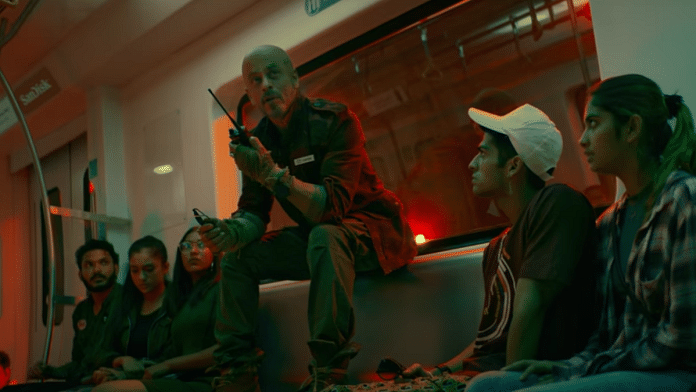It isn’t every day that a mainstream masala movie mentions the 1984 Union Carbide Bhopal gas tragedy. But the latest Shah Rukh Khan-starrer Jawan touches upon it not once, but twice. On the face of it, this is a reminder about what is arguably the worst industrial tragedy whose fallout – medical, legal, and moral – still continues. It is a call for clean industrialisation.
But under the garb of shutting down polluting industries, the Atlee directorial sends a sharp message to big business. The movie doesn’t argue for more robust environmental regulations and the rule of law. Instead, its solution is to put a lock. One of Jawan’s celebratory scenes shows how people’s power shuts down 40 polluting factories. Women put a red seal on the locks.
This shutting down of factories is a movie image right out of the last century.
Jawan is a very 1970s’ movie – and Shah Rukh Khan comes off like a Robin Hood, an angry young man raging against multiple problems constituting that amorphous thing called the ‘system’. But SRK is no Amitabh Bachchan of the 1970s. Quite the opposite. He is no anti-corporate, redistributive socialist.
Also read: SRK changed from Pathaan to Jawan. It shows North-South divide in patriotic action films
Why ‘gareebon ka God’ now?
Shah Rukh Khan has been jawan before, but never in this way. In fact, his movie characters have joyfully mirrored the post-liberalisation India story of conspicuous consumption, middle-class aspiration and greed, urbanism and an unquestioning embrace of the nostalgic NRI. Shah Rukh’s on-screen characters and off-screen persona have all championed the seduction of capitalism and wealth creation. In many interviews, he has said that the pursuit of money isn’t as bad as it is made out to be and that money does buy you happiness and freedom.
So why has Shah Rukh Khan suddenly turned what looks like a socialist gareebon ka God in Jawan?
It’s because he is angry. And the only readily available template for masculine movie anger in India is a socialist one. In Jawan, this anti-capitalist outlook becomes an excuse and a stage for his character to vent.
Shah Rukh Khan ko gussa kyun aata hai? Especially 43 years after Albert Pinto Ko Gussa Kyon Ata Hai. His main peeve is with the people of India — “Why have they stopped asking questions?” The anti-business plot is merely the stage for him to air this peeve.
Also read: ‘People’s man’ of Tamil cinema Vijay Sethupathi never plays a character. He becomes them
Tamil cinema meets Shah Rukh Khan
Hindi cinema has moved way past portraying business as bad in the past three decades.
So, something else is at play here.
It has more to do with the Tamil cinematic ideology and the quest for pan-Indian success than Shah Rukh Khan’s own ideology. From the rich-poor divide to caste wars to politics-business nexus – these are the stock villains in Tamil cinema.
Atlee is moulded in the Nayak-style Kejriwalesque andhadun anger that rests on the reductionist analysis of the world: Sab mile huye hain. Jawan rages against corporate debt restructuring, farmer suicides, and crumbling public hospitals. SRK even takes ransom money from an industrialist and distributes it to the poor indebted farmers across India. This is actually the Satyameva Jayate territory of Aamir Khan.
The cast of villains includes a bumbling politician, a bribe-taking, lying bureaucrat, and aggressive loan recovery agents. But the centrepiece of Jawan’s sin-verse is an unapologetically evil industrialist who funds politicians’ campaigns, bags government contracts, runs a corrupt, criminal corporate empire, and invites foreign investors to set up toxic polluting factories in India because the environmental regulations are weak here. The portrayal of big bad business is reminiscent of Namak Haraam (1973) and Trishul (1978).
The anger isn’t personal
Maybe in 2023, anti-establishment takes on an anti-businessman tinge even if you have celebrated economic reforms earlier – whether you are Congress party or Shah Rukh Khan. That is also the current ‘predicament’ of the Indian liberal that author Gurcharan Das outlined earlier this month at a lecture in Delhi. Classical free-market liberals find themselves on a lonely road because the word ‘liberal’ has been taken over by Leftist ideology, he said.
The villain in Jawan may be old-school, but the anger is real and raw.
And Shah Rukh Khan has chosen to be angry at the age of 57. It’s a deliberate, carefully constructed reinvention. Belated, some would say.
In recent years, many Indians have called out the three reigning Khans of Bollywood for their silence in the face of rising social and political contempt for Muslims in India. That silence has now been broken by Shah Rukh Khan. But when he did, he didn’t speak as a Muslim or for Muslims. He spoke as an Indian and carpetbombed his anger — at the whole buffet of problems – from oxygen cylinder shortage for encephalitis children to unthinking voting on EVMs.
And the anger isn’t personal. Atlee came on board to do this film in 2019, way before the Aryan Khan episode.
This is not the first time SRK has been angry. He was angry in Chak De! India and impatient in Swades too. But the anger in Jawan has a different texture. It is scorched earth here.
The last line, mouthed by Jawan’s villainous businessman called Kali, is: “Let’s make a deal.” Khan’s uncompromising reply: “No deal.”
Views are personal.
(Edited by Humra Laeeq)



